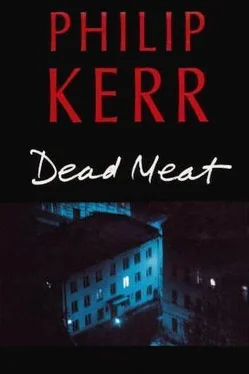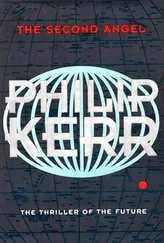Having signed these arrest protocols, the next task was to justify them, and this required me to sign personal-search protocols and interrogation protocols. But to search the Goose’s apartment for goods stolen from the old woman meant that I was going to need the relevant protocol stamped by the State Prosecutor’s Office. So I called Vladimir Voznosensky and then went straight over there with the two detectives in their car. To some this might have all sounded rather bureaucratic, but that would have been to forget that the investigator was the best guarantee of a suspect citizen’s rights.
I had not long arrived back at the Big House when I received a call from an old friend at the GUITI, the Chief Directorate of Corrective Labour Institutions. I had telephoned him earlier that same day to check on Sultan Khadziyev, the Chechen pimp whom Mikhail Milyukin had helped to put in the zone. My friend, whose name was Viktor, had been able to discover that Khadziyev had been serving his sentence in Beregoi 16/2, a camp that was close to the Kazakh border in western Siberia. Now he told me that Sultan had been released four weeks ago. For good behaviour. ‘But he couldn’t have served more than half of his sentence,’ I said.
‘I don’t understand it myself,’ said Viktor. ‘I called the regime chief at the camp and he assured me that a proper release order, authorised by this Directorate had been received. Believe me, I intend to investigate this matter thoroughly.’
‘Does the camp commander know where Khadziyev went?’
‘Apparently he spent a few days in the camp infirmary taking advantage of the medical facilities. The way things are on the outside these days, if you get sick you’re better off as a zek . After that they gave him a salary cheque for seventy-five roubles and a railway warrant from Omsk back to St Petersburg.’
‘Let me know what you find out, Viktor.’
I was about to call Grushko and tell him what I had learned when the phone rang again. This time it was Nikolai.
‘I’m downstairs,’ he explained. ‘There’s been a hit. The boss wants to know if you can come with us.’
‘I’ll be right down.’
I found Nikolai, Sasha and Grushko waiting in his car on Kalayeva Street.
‘It looks like the gang war might just have started,’ said Grushko, turning south on to Liteiny Prospekt. ‘A couple of Mafiosi just got their wooden pea-jackets.’
I told them about Sultan Khadziyev.
‘Good behaviour, eh?’ he said. ‘Well, that’ll give us something to talk about when we’ve got him in our bag of maybes.’
‘Want us to find him, Colonel?’ said Nikolai.
‘Unless the dull definition of detective has escaped you. Let’s just hope he’s not today’s dead meat.’
Bordered by apartment blocks and the Hotel Pulkovskaya, Victory Square is in reality an enormous roundabout at the southern end of Moscow Prospekt. Marking the former frontline of the Nazi advance on the city is a wide keyhole-shaped area of paving stones and sculptured groups that constitutes a monument to the heroic defenders of Leningrad. At its centre, standing within an incomplete circle of granite, is a fifty-metre-high obelisk. Near to its base is another typically Soviet group: a Red Army soldier supporting a woman faint from starvation; a wife comforting her wounded husband; and a mother holding the lifeless body of her child. It was only a couple of weeks since Remembrance Day and several bunches of flowers still lay at the feet of these heroic figures. At the base of the granite plinth which the figures occupied lay the bodies of two men, cut to pieces with a machine-gun that was at least the destructive equal of the one carried by the bronze soldier. Each man had been hit fifteen or twenty times, but before running away the killer had, according to a witness, stopped to light a cigarette and sweep some of the flowers off the plinth and on to the bodies. There was blood everywhere, as if someone had dropped a five-litre jug of wine from the top of the obelisk. One of the dead men still clutched a handful of the dollars he had been about to hand the other, while stray bills blew around the stone circle like dead leaves.
Dead meat was right, I thought. It was hard to think of these two men as at all human now. They looked ready for a butcher’s hook.
The man clutching the dollars was dark-skinned, with moustaches that were the same length, colour and shape as his eyebrows. In the breast pocket of his suit was a pair of aviator-style sunglasses and he wore his tie in a double-knot that managed to make it look too small, as if it were a schoolboy’s tie. Grushko reached inside the man’s blood-stained jacket and withdrew a wallet and an identity card.
‘Ramzan Dudayev,’ he said. ‘Sounds like a Chechen name. But it’s hard to tell with these churki bastards.’
The wallet produced several stolen credit cards and yet more dollars, while Nikolai found a revolver tucked underneath the dead man’s snakeskin belt.
‘You can’t be too careful these days,’ he muttered.
The second man was younger, with spiky hair and several days’ growth of beard. His lightweight suit was of a better cut than his friend’s but no more bullet-proof and he wore a button-up vest instead of a shirt and tie. His wallet had been neatly holed by a bullet. Grushko tried to read the name on the bloodstained identity card.
‘Abu Sin... something or other,’ he said. ‘Sinbad the bloody sailor.’
Sasha turned up a set of amber prayer-beads, a large and greasy wad of roubles, a flick knife and a small cigarette case with the picture of a naked model embossed on the lid. He opened the case and sniffed at the roll-ups it contained.
‘Kojaks,’ he said.
‘These Muslims like to smoke their bit of clover,’ Grushko observed. He stood up and turned towards me.
‘So, how do you like our Petersburg Mafia? The price of a hit like this is 50,000 roubles. Or around $230, if you want to pay hard currency. For an outside job. Of course the Georgians might just have preferred to have done it themselves. They take their revenge very personally.’
‘Do you think that these are the two who murdered Milyukin and Ordzhonikidze?’ I asked him.
He took out his handkerchief and wiped some of the blood off his fingertips.
‘Assuming that the Georgians do think that it was the Chechens who were behind it, no, I reckon they just put these two on account. At least until they have a better idea of who killed Vaja. You see, with the Mafia it’s almost as important that you hit someone as it is that you hit the right person. Otherwise it looks bad for business. Like you’re letting things slide.’
I shook my head at the sheer waste of it all.
‘You’d better get used to this sight,’ he said. ‘You can bet you’ll see a lot more.’ He spat copiously, lit a cigarette and started towards the steps leading up from the stone circle. ‘And it makes finding Sultan Khadziyev even more urgent. Before the Georgians can book him on the same flight as these two.’
‘Sultan’s a pimp, sir,’ said Nikolai, following. ‘Chances are he’ll find a couple of cash-cows and get himself started again. Why don’t Sasha and I check a few of the hotels? Speak to some girls and the local melody. Maybe they can point us in the right direction.’
‘I’ve got a better idea,’ said Grushko. ‘Check all the hotels.’
As we came up the steps, the Central Board’s Scientific Research Department van was drawing up alongside the circle’s entrance.
‘Sorry we’re late, sir,’ said one of the experts, ‘but our van broke down.’
Grushko shrugged and continued on his way. When he reached the car he looked around at the monument to victory.
‘Did we really win?’ he said, shaking his head sadly. ‘Or did the krauts just lose?’
Читать дальше












